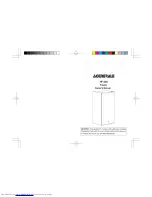
e n g l i s h
15
3
Maintenance and
cleaning
3.1 Interior cleaning.
To clean the interior, use
a sponge or cloth soaked in water with
bicarbonate in order to prevent odours
developing.
In no case use steam cleaning machines,
solvents, or abrasive detergents.
3.2 Exterior cleaning.
Do not clean the screens
with a steam cleaning machine.
It is advisable to clean the back vent once a
year with a vacuum cleaner.
3.3 Cleaning the accessories.
Accessories
are not suitable for automatic dishwashers.
Clean them by hand with a sponge or cloth.
3.4 Changing the lamp.
In the case that the
lamp goes out: disconnect the refrigerator.
Remove the cover by pressing the tab (3.4.1,
3.4.3) or removing the screw (3.4.5. 3.4.6)
and take out the burnt out lamp (3.4.2, 3.4.4,
3.4.7). Replace it with another with the same
type of thread, E14, 220-240V, 15/25W or
according to fi xture instructions.
3.5 Changing the carbon fi lter.
The refrigerator
may incorporate a carbon fi lter that absorbs
the odours of certain foods and retains
microorganisms (fungus and bacteria)
circulating in the air.
The fi lter keeps its properties for 6 months.
After that time, it is recommended to replace
it. Its location varies based on model.
Remove the cover by pressing the tab (3.5.1,
3.5.3, 3.5.5). Remove the fi lter (3.5.2, 3.5.4,
3.5.6) and loosen the seals (3.5.7). Put the
new fi lter in place.
To activate the fi lter: press
for 5 seconds
to get to the confi guration menu (3.5.8).
Press
multiple times until
appears on
the display (3.5.9). Press
to verify (3.5.10).
To exit the menu press
for 5
seconds (3.5.11).
Keep the old fi lters and the replacements
out of the reach of children:
Ingesting a
large quantity could be dangerous.
Don’t get the fi lter wet,
as it will lose it
properties.
3.6 S.P.A. salus per aquam (optional)
Your refrigerator may incorporate the S.P.A.
accessory which maintains a constant level
of humidity in the vegetable compartment,
preventing drying.
It is located in the vegetable compartment
drawer separator (3.6.1). It consists of a
receptacle with a pouring container and
a fullness level indicator. When the S.P.A.
4
Diagnostics
4.1 Door open.
If the door stays open for more
than 2 minutes, an alarm will sound and
the refrigerator light will go off. The alarm is
disconnected when the door is closed.
4.2 Freezer not cold enough.
• If the temperature of the freezer is
unusually high, the
icon on the display
will blink and a beeping sound will be
activated. Initiate the rapid freezing mode
to manually deactivate the beeping (2.3.1,
2.3.2, 2.6.1).
• The fi rst time the refrigerator is connected,
the
icon will appear, but the alarm won’t
sound.
4.3 Loss of electrical power.
If there is a loss of electrical power, open the
doors of the refrigerator as little as possible.
Power loss warning function:
There is
a warning in the case that there has been
a power loss as well as an indication of
whether the food is still good.
To activate / deactivate: Press
for 5
seconds to get to confi guration (4.3.1). Then
press
several times until the
icon
blinks (4.3.2). Press
to activate (4.3.3)
and exit the menu by pressing
for 5
seconds (4.3.4).
After a loss of electrical power, if you see the
icon it means that the food in the freezer
should be eaten. The icon means that
the food thawed some time ago and should
be thrown out. On the text line “CANCEL
POWER LOSS WARNING” will appear. Press
to cancel it (4.3.5).
4.4 Normal refrigerator noises
It is perfectly normal for your refrigerator to
make certain noises while it is running and
you should not worry about them.
• The coolant gas can make a bubbling
sound as it circulates.
• The compressor may make humming or
tapping sounds, especially at start-up.
• The expansion and contraction of material
used may make clicking or creaking
sounds.
• The air that moves the freezer ventilator
may generate a light background sound.
needs water, the level will become hidden.
Take out the container (3.6.2) and use it to
refi ll the receptacle (3.6.3).
The fi lter should be changed every 2 years
(3.6.4).
















































